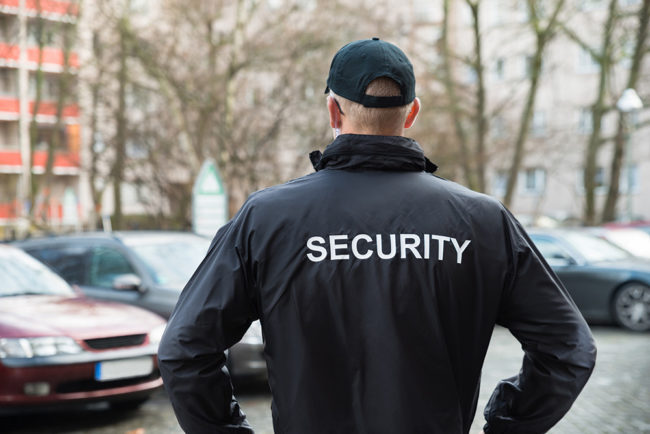Security is a rewarding line of work in today’s safety-conscious world.
In the wake of events such as the El Paso shooting, organizations are starting to see the value of keeping security professionals on their payroll. If you want to keep people and property safe as a job, you will want to learn how to be a security guard.
Becoming a security guard involves several steps. You will need to meet certain requirements, apply for licensing and training, and find a suitable job post. Additionally, you will have to cultivate a security-minded attitude to succeed in this line of work.
If you have no previous experience working in security, you probably have a lot of questions on your mind. And to help you find the answers, we will walk you through the basics of becoming a security guard.
How to Be a Security Guard: Basic Requirements
Each professional security guard has to fulfill a list of basic requirements.
These include state-prescribed, as well as organization-specific ones. Let’s go over some of the most common ones.
Age Limit
To qualify as a security guard in the US, you need to be 18 years of age.
If you plan on working abroad, you will need to check the requirements of your country of choice. And if you’re applying for a position that requires you to have a gun permit or a driver’s license, you will need to qualify for these as well.
Clean Record
Before you can start working in security, you will need to pass a mandatory background check.
You will need to have a clean police record and provide your fingerprints to the local police. A more thorough psychological screening might be required in some states as well.
Proof of Academic Achievement
All state-approved security jobs require you to have at least a high school diploma.
Some high-profile organizations might demand a bachelor’s degree as well. Having a major in law or political science can be beneficial as well.
Optional: Driver’s License
While a driver’s license is not mandatory for most security jobs, having one is still beneficial.
If someone gets injured on your watch, you can drive them to the hospital. Having a driver’s license is also a prerequisite for working as an armored car guard.
Acquiring a License
In order to actually start working as a security professional, you will need to apply for a license.
Requirements vary from state to state, so be sure to get acquainted with ones applicable in your area of residence. You can also expect to pay a fee of around $50 in most states.
Mandatory Security Training
The main prerequisite for getting a security license is to undergo mandatory security training.
In some cases, you will have to apply for training in a state institution, while in others you can also apply with a third-party organization. Security training involves learning how to detain subjects, use security equipment, and follow emergency procedures.
Fingerprint Registration
As a security professional, you have to be accountable to your local police department.
This means getting your fingerprints registered at a licensed fingerprinting site. You will have to pay a fee, and in return, you will be issued an official fingerprint card.
Additional Training
If the security job you’re gunning for requires you to use specialized security equipment, you will need to undergo extra training.
For example, you might need to learn how to operate an armored vehicle, handle an electric baton, or use submission tactics.
Succeeding at the Job
Once you acquire a license, you can start looking for jobs.
Finding work in security is similar to finding work in other industries, with a few caveats which we will cover. And in order to keep your job, you will have to polish and maintain your skills as well.
Choosing an Industry
You can find a job as a security professional in practically any industry, but each of them has its advantages and disadvantages.
For instance, working in retail is easier and safer than working at a military facility, but it pays less and is less involving. In order to work in some industries, you will have to fulfill additional requirements, such as learning first aid for working in medical facilities.
Performing Daily Duties
A major part of professional security work involves performing daily security office duties.
These will vary from one job to the next, but there are many common ones as well. Examples include checking credentials, paroling the premise, watching for suspicious individuals, and writing daily reports.
Maintaining Composure
In order to meet the challenges of working as a security professional, you will have cultivate nerves of steel.
You will have to be observant throughout your entire shift, and be ready to respond to trouble at a moment’s notice. You will also have to keep a cool head in crisis situations.
Knowing How to Communicate
Communication is an essential part of security work.
Keeping a place secure involves knowing how to talk to people within the organization, customers and bystanders, as well as people looking for trouble. Picking your words carefully will help you de-escalate a situation more effectively than with physical force.
Maintaining Physical Fitness
When words fail you, however, you will sometimes have to use physical force to resolve the situation.
This might involve subduing targets, helping bystanders, or protecting equipment. Doing this effectively requires you to maintain your physical fitness with regular training.
Making Quick Decisions
The true challenge of security work is handling unexpected situations.
If a culprit starts exhibiting threatening behavior, you will need to respond quickly and appropriately to minimize harm. And being proficient at making moment-to-moment decisions is absolutely essential to do this.
How to Be a Security Guard in the Modern Age
Professional security is a highly viable career path in today’s world.
The demand for security professionals is at an all-time high, and if you know how to leverage the opportunity you can reap substantial rewards. Take the first step to find meaningful employment in the security industry by taking our advice on how to be a security guard.








